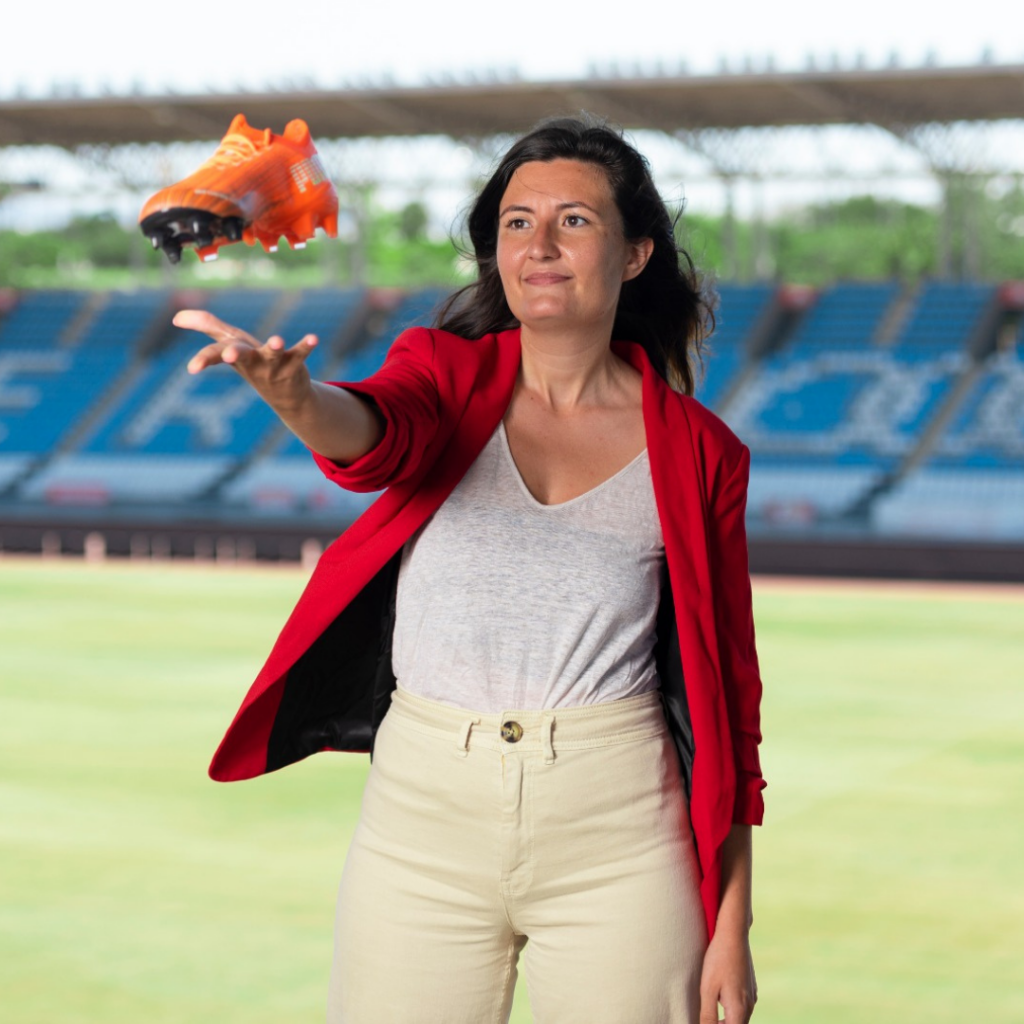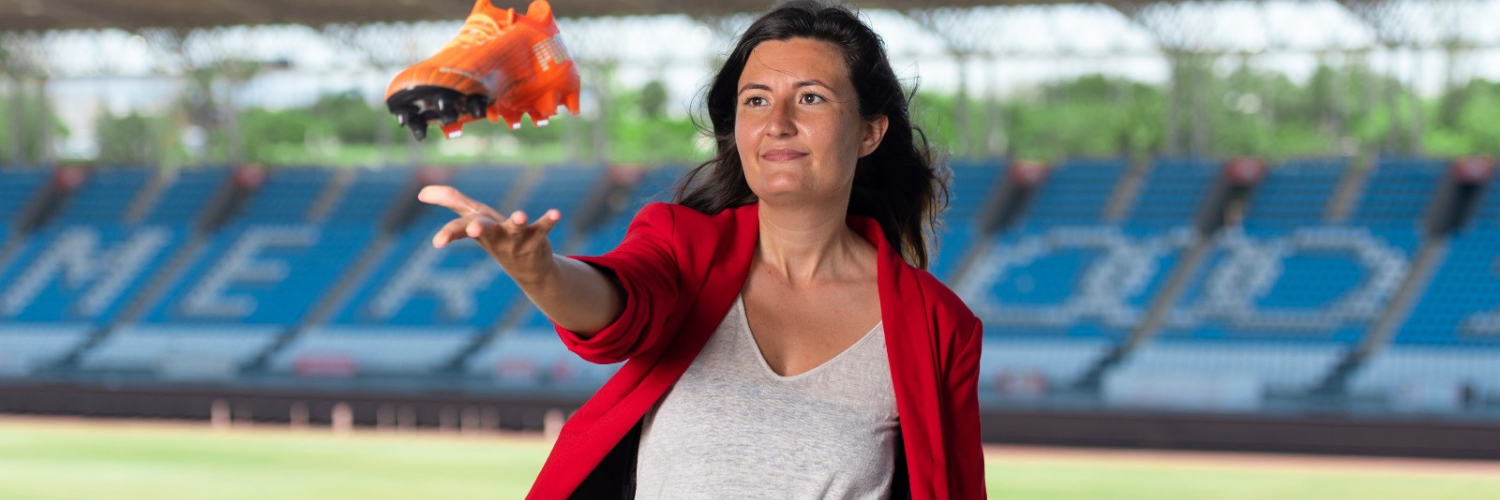Lorena García from UD Almería
This interview features Lorena García who is the Director of UD Almería Foundation. The interview is part of our Women in Football campaign, which focuses on creating visibility for women working in the football industry.

- How does your day-to-day work as Director of UD Almería Foundation look like?
Every day I can combine football, which is my passion, with social work, so every day I start with enthusiasm to be able to combine the two things I like the most, football and being close to groups and people. Before in the world of football, many people were excluded and now this has no place, we are all together.
2. What are your goals for this year?
This year, because of the pandemic, it has been quite complicated to start certain activities such as, for example, the schools for people with disabilities, in which we have more than 72 members.
We want to break down those barriers, help them, come back to training and we would also like to grow in other aspects, because we are focused only in Almeria. We believe that what football gives us we have to share it with society, also helping in projects outside Almeria.
3. Was it difficult for you to get into the world of football?
The truth is that it was relatively easy for me to enter here, as my father is the former owner of the club, but obviously, I have always been required to have previous training and I have always fought to achieve what I set out to do.
I have always been passionate about football and Almeria, and once ownership changed, I was lucky to be able to meet the new owners, who saw my work, supported me and left me in charge of the foundation and the club’s legal department. I am very grateful and always trying to improve.
I believe that football is vocational and I am lucky to be able to work for the team of my life and that is reflected in the day to day, that effort and commitment.
4. At the educational level, did you have any limits because you were a girl?
Not really. My parents have told me from the first moment that I could become whatever I wanted with training, commitment and hard work.
They didn’t set any limits for me. We are four siblings and we have always been brought up as equals.
5. Did you have any (female) role models when you were younger?
Because my mother suffers from a degenerative disease, I always looked a lot at Frida Kahlo, who is a bit of a reference of overcoming that my mother reflected in her day-to-day life and that also made an impact on me.
6. What is the biggest challenge you have faced so far in your career?
Creating the foundation from scratch. It didn’t exist before, there was nothing.
I studied Law, I started in the world of football, I loved it and I saw that we had to give back to Almeria’s society a part of it that we had not taken into account in the past.
I saw what other clubs were doing with their fans, their city, how they managed other groups, how they were supporting women’s football, and this was a lack we had within the club, so I did not hesitate to create the foundation, take it forward and every year propose small challenges.
7. And the biggest changes you’ve seen?
For example, when La Liga had Patricia Rodríguez as Vice President. The truth is that La Liga has grown a lot in recent years and there are more and more women in different positions, which is something that was not seen before.
The same happens in the boards of other clubs and foundations. I think there is still a long way to go, the numbers are not yet equal, but it is true that in recent years there has been a progression of women in the world of football.
It is necessary to communicate that you can be here regardless of gender, that it can be achieved, and also to take away the fear of women and encourage them to fight for any job position.
Spanish version (original)
- ¿Cómo es tu día a día trabajando como Directora de la Fundación Almería UD?
Cada día puedo compaginar el fútbol que es mi pasión con lo social, por lo tanto, cada día empiezo con ilusión al poder combinar las dos cosas que más me gustan, el fútbol y estar cerca de colectivos y de personas. Antes, en el mundo del fútbol, muchas personas estaban excluidas y ahora esto no tiene cabida, estamos todos juntos.
2. ¿Cuáles son tus objetivos para este año?
Este año, por la pandemia, ha sido bastante complicado empezar ciertas actividades como por ejemplo, las escuelas para personas con discapacidad, en las que tenemos a más de 72 miembros.
Queremos romper esas barreras, ayudarles, volver a los entrenamientos y nos gustaría también crecer en otros aspectos, porque estamos focalizados sólo en Almería capital y nos gustaría abrirnos a la provincia. Creemos que lo que nos da el fútbol tenemos que compartirlo con la sociedad, ayudando también en proyectos fuera de Almería.
3. ¿Fue difícil para ti poder trabajar en el mundo del fútbol?
La verdad es que para mí entrar aquí ha sido relativamente fácil, ya que mi padre es el antiguo dueño del club, pero obviamente, siempre me han exigido una formación previa y siempre he luchado por conseguir lo que me propongo.
Siempre me ha apasionado el fútbol y Almería, y una vez que se cambió de propiedad, tuve la suerte de poder conocer a los nuevos propietarios, que vieran mi trabajo, me apoyaran y me dejaran al mando de la fundación y del departamento legal del club. Estoy muy agradecida en ese aspecto y siempre intentando mejorar.
Creo que el fútbol es vocacional y tengo la suerte de poder trabajar en el equipo de fútbol de mi vida y eso se refleja en el día a día, ese esfuerzo y compromiso.
4. Y a nivel educativo, ¿tuviste algún límite por ser niña?
La verdad es que no. Mis padres desde el primer momento me han dicho que podía llegar a ser lo que quisiera con formación, compromiso y trabajando duro.
No me pusieron ningún límite. Nosotros somos cuatro hermanos y siempre nos han educado de manera igualitaria.
5. ¿Tuviste referentes cuando eras una niña?
Debido a que mi madre padece una enfermedad degenerativa, siempre me fijé mucho en Frida Kahlo que es un poco el referente de superación que en el día a día mi madre se reflejaba y a mí también me hacía mella.
6. ¿Cuál es el reto más grande al que te has enfrentado?
Crear la fundación desde cero. Antes no existía, no había nada.
Estudié Derecho, empecé en el mundo del fútbol, me encantaba y vi que teníamos que devolverle a la sociedad almeriense una parte que no habíamos tenido en cuenta.
Veía lo que hacían otros clubs con su afición, su ciudad, como dirigían otros grupos, cómo apostaban por el fútbol femenino y esto era una carencia que teníamos dentro del club, así que no dudé en crear la fundación, llevarla adelante y cada año proponerme pequeños retos.
7. ¿Y los mayores cambios que has visto?
Por ejemplo, cuando La Liga tuvo a Patricia Rodríguez de Vicepresidenta. La verdad es que La Liga ha crecido mucho en los últimos años y cada vez hay más mujeres en distintos cargos, que es algo que no se veía antes.
Lo mismo ocurre en directivas de otros clubes y fundaciones. Creo que queda mucho por hacer, los números no son todavía igualitarios, pero es verdad que en los últimos años sí que ha habido una progresión de la mujer en el mundo del fútbol.
Hay que comunicar que estar aquí no entiende de género, que se puede conseguir y quitar también ese miedo a la mujer y animar a que luche por la posición laboral que sea y donde sea.
You can find the overview with all role models here.


